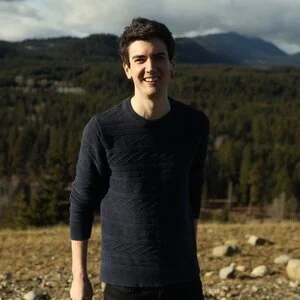Review: Introspective ‘Fire of Love’ Burns Bright
Clods of molten rock break the Earth’s crust and rain down in parabolic streaks at the feet of a slight, French chemist. The vibrant red of the 1,200°C lava matches her 1970s knit cap in the grainy definition of the 16mm footage. This is Katia Krafft and behind the camera is her gruff geologist husband Maurice. Together they are perhaps the only volcanologist couple of their time doing hands-on research within spitting distance of eruptions. Alongside a cast of the most infamous and intimidating active volcanoes around the globe, they are the focus of Sara Dosa’s introspective documentary Fire of Love.
The Krafft’s fall for each other and volcanoes at university and spend their honeymoon with their first lava spewing loves— Italy’s Mt. Etna and Mt. Stromboli. Soon, their recreational pictures of flows and eruptions draw interest and create a name in the under researched field of volcanology. By the 1970s, anytime eruption signs occur, a network of people telegram and phone the news to the Kraffts who hastily travel to get closer than anyone else would or should to the hottest natural creation on the planet.
But the constant travel and long research excursions come at a monetary and existential price. For funding, Katia writes textbooks and sells photographs of the viciously viscous flows while Maurice films countless reels for homemade television documentaries and media appearances. It’s tough work. The amount of perseverance to get to the often remote and spewing mountains is immense but not even 27 car breakdowns will keep them from their shared passion. Once arriving at the volcano, their joy in study is infectious. Katia dirties her hands excavating ash to study the most minute details the rock can tell her. Maurice wanderingly explores while taking a more big picture view of the fraught geological situation. Despite the curdling circumstances, we even manage a laugh at the Krafft’s frying of a pan of eggs on a lava flow or Maurice joking there is a rift in their marriage because Katia has visited 170 eruptions to his only 150. We know there isn’t another place they’d rather be.
Even though Maurice has a lifelong ambition to canoe down an active lava flow, the Krafft’s are more than daredevils fascinated with the adrenaline of standing within an eruption radius. They harness their volcanic love and romantic love for knowledge in a fledgling field of science. Their contributions have real consequences. In 1985, officals ignore warnings from volcanologists, including the Kraffts’, when active volcano Nevado del Ruiz exhibit eruptions signs. An estimated 23,000 people perished in the subsequent lava flow. For Katia and Maurice, the travesty compounds their dedication to the safety of the masses with these volatile situations. They set out to further research in predicting eruptions.
The Krafft’s work comes with obvious dangers but time and time again their curiosity is prioritized over their survival instinct. “I prefer an intense, short life to a long, monotonous one,” remarks Maurice at one point. And from the outset, Fire of Love reminds us of the consequences of this lifestyle. Through subdued narration from Miranda July, we’re aware of the Krafft’s ill-fated ending at the hand of the thing they love the most early on in the film. Unlike the eruptions they study, their demise is almost predictable.
But Fire of Love isn’t a technical documentary about the intricate mechanism of volcanic eruptions, though it has foundational collage animations for the uninitiated scientists among us. Nor is it a storm-chasingesque showcase for adrenaline junkies. Through July’s poetic and contemplative voice over on top of Katia and Maurice’s archival footage, director Sara Dosa seems to be asking the audience one core question: what do the Kraffts’ choices mean about humanity?
The truth is, people often don’t have the perspective to see geological time on its grand scale. For most, the ground is stationary rather than a series of tectonic plates colliding and separating at lingering rates. A river flows through the same dirt as last year, rather than subtly cutting its riverbed in a million-year long struggle to create a canyon. But these processes have an effect on us in the ephemeral time that we share the Earth with each other. Rather than just romanticizing the lure of primal power of volcanoes with Katia and Maurice’s story, we find ourselves falling for the curiosity of knowledge and contagious passion of strangers. With Fire of Love, the Krafft’s dedication to their romance burns bright and fast and invites us to look closer at our home planet and eventually ourselves.
—



